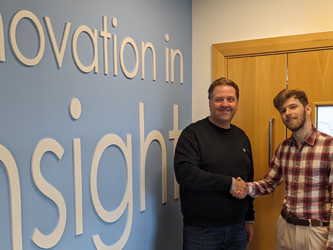Learning on the job: the role of apprenticeships
Since 2019, the Market Research Society has been working with a group of research employers to develop a research apprenticeship, following the introduction of a government apprenticeship levy applying to all employers in England with an annual pay bill of more than £3m.
After years of work from the trailblazer group, the market research executive apprenticeship is set to launch in 2022. Louise Maycock, head of talent at Ipsos Mori, who has chaired the group since it was formed, says there was a gap in the industry for an apprenticeship covering core research work.
“There was no core research apprenticeship available, therefore there was a big gap in our industry to bring in apprentices to do our core work,” says Maycock. “For example, in Ipsos, we bring in project management apprentices and business admin apprentices, but they can’t work on the core of research with clients during the apprenticeship because the apprenticeship standards have to be very closely aligned to the work you do, as it’s vocational and you have to demonstrate the work you do. So, we had a big gap in the industry in our core market research.”
The group, which has more than 20 members, including Channel 4 and Disney, worked collaboratively to create the standard knowledge, skills and behaviours required, explains Maycock.
“We had to work together to create and agree what we thought the knowledge, skills and behaviours of a market research executive are, and make sure that they applied across all sectors – agency side, client side, public sector, private sector, charity. We had to make sure all the things we included as competencies could be achieved by a market research executive working in all sectors, so that took a little while to agree, create and work through.”
The group has created an end-point assessment plan and worked to find a training provider that could produce a training plan against the assessment, which will be piloted with a few apprentices from this autumn, before launching in 2022.
Making sure the standard was applicable and achievable for apprentices across the board was challenging, says Maycock, as was disruption caused by Covid-19, with the group unable to meet in person or focus as much time on developing the apprenticeship.
At Ipsos Mori, Maycock says the apprenticeship – a Level 4 qualification aimed at people who have done A-levels – will be used as an alternative entry point for new recruits. “We are traditionally a graduate employer and have a big graduate scheme, so we are working on how we create a really strong apprenticeship programme to complement our grad scheme.
“Our graduates join and in one year they become a research executive – for our apprentices, the programme will be 18 months. We will recruit people in the same way, but they will not have gone to university, and they will become a research executive in 18 months, instead of 12.”
Attracting a new talent pool to the industry is increasingly important in a post-pandemic jobs market because of the other options available to young people, says Maycock.
“The opportunity to bring new fresh thinking into our industry as opposed to others; it’s a real requirement now because of the way the world’s changing.”
Ipsos Mori’s experience of taking on apprentices to date – in areas such as project management – has been that they tend to be from more diverse backgrounds than those joining through the graduate programme.
For Clare Bamberger, head of insight at the House of Commons and a member of the trailblazer group, it’s important for the research industry to have apprenticeships because of the increasing demand for quality insight for decision-making.
“It’s not an obvious career path, so having an apprenticeship can attract a new diverse pool of candidates who will better be able to represent the audiences and understand the products and services they are researching. Not needing a degree to start is an important step – this is open to everyone, provided they meet the criteria,” says Bamberger.
“Market research is not just one thing. The spread of sectors and specialisms in market research is very wide, so the more we can upskill people early in their career with a variety of career paths to choose from, the better we can attract and retain talent in the industry.”
Less traditional route to research
“An apprenticeship isn’t for everyone, but it worked incredibly well for me,” says Amanda Hammond, research executive at Opinium, who left school after sixth form to begin her career as a research apprentice at ITV. “If I had carried on with my A-levels and gone to university, I would have only graduated last year. Instead, I’m almost five years ahead of my peers in terms of contacts, experience and salary.”
Hammond feels apprenticeships are important for the industry to foster greater diversity and offer different perspectives.
“Our entire industry is built on understanding people and what they think, feel, and do – but to truly understand our environment, our workforce needs to be as diverse as possible. “Apprenticeships can provide those different perspectives and allow people who may not be able to access our industry via the traditional routes (for example, internships or graduate programmes) an entry point. I hope the creation of this scheme means that apprenticeships in research will be viewed on the same level as university education, because the work we do is so diverse, and our workforce should reflect that.”
In order for the apprenticeship to be successful in redressing the industry’s lack of diversity, take-up should be encouraged from under-represented groups, says Hammond. “To do that, we need to educate people about this brilliant opportunity, in particular those in sixth form and college, so market research becomes as highly considered as other marcomms industries like marketing and advertising.”
Maycock concurs, saying that the next step once the apprenticeship has launched is promoting it. “We need to make sure people know that it exists – we need to work with schools and other organisations to get the word out there that we have this opportunity in the industry that people may not know about. I think that’s the challenge – how to publicise and communicate this in the right places to get people interested in research as a career.”
This article first appeared in the October 2021 issue of Impact magazine.

We hope you enjoyed this article.
Research Live is published by MRS.
The Market Research Society (MRS) exists to promote and protect the research sector, showcasing how research delivers impact for businesses and government.
Members of MRS enjoy many benefits including tailoured policy guidance, discounts on training and conferences, and access to member-only content.
For example, there's an archive of winning case studies from over a decade of MRS Awards.
Find out more about the benefits of joining MRS here.














0 Comments